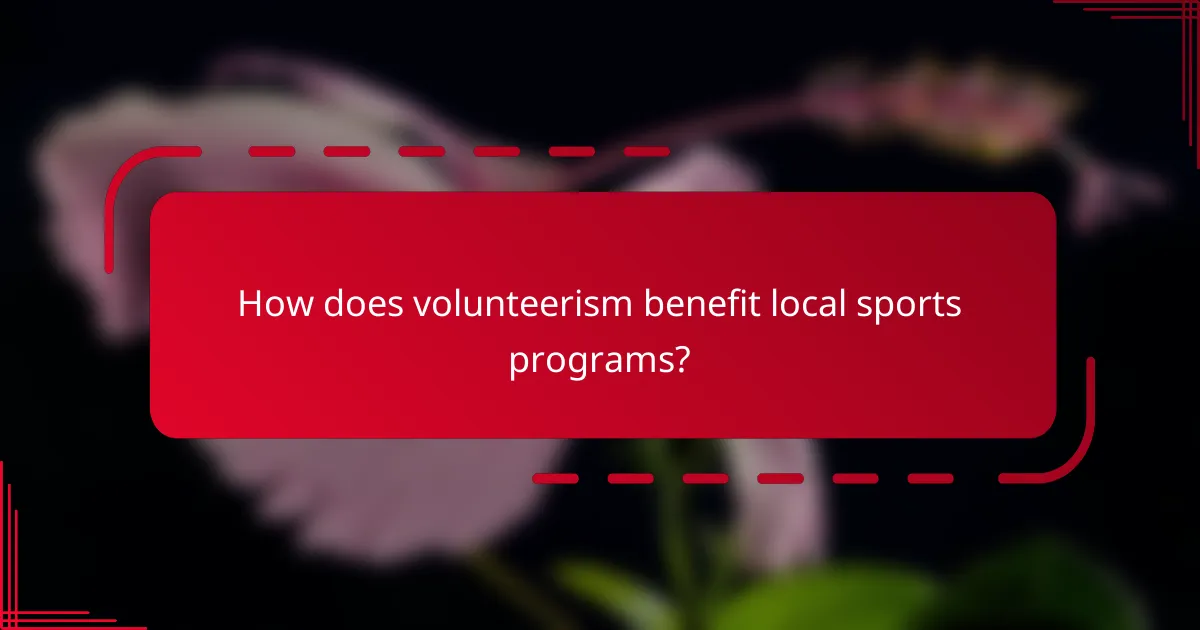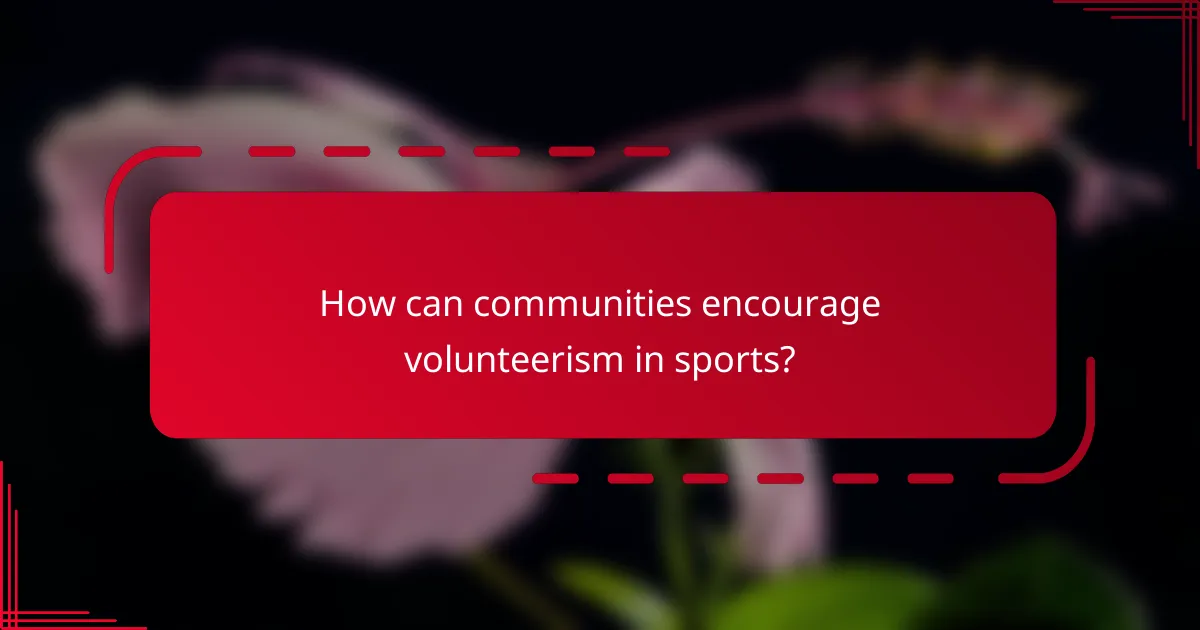Volunteerism plays a crucial role in the success of local sports programs by offering vital support and resources that enhance the experience for both participants and the community. By dedicating their time and skills, volunteers help ensure that these programs run smoothly, fostering greater involvement and enthusiasm among athletes and spectators alike.

How does volunteerism benefit local sports programs?
Volunteerism significantly enhances local sports programs by providing essential support and resources that might otherwise be unavailable. Volunteers contribute time, skills, and enthusiasm, which can lead to improved experiences for participants and greater community involvement.
Enhances community engagement
Volunteerism fosters a sense of community by bringing together individuals who share a passion for sports. When community members participate as volunteers, they create stronger connections with each other and with the athletes, leading to increased attendance at events and a more vibrant local culture.
Engaged volunteers often become advocates for the program, promoting it through word-of-mouth and social media. This organic promotion can attract more participants and spectators, further solidifying the program’s presence in the community.
Improves youth development
Volunteers play a crucial role in mentoring young athletes, providing guidance and support that can positively impact their personal and athletic growth. Through their involvement, volunteers can teach valuable life skills such as teamwork, discipline, and resilience.
Programs that utilize volunteers often see improved youth participation rates, as children are more likely to engage when they feel supported by caring adults. This mentorship can lead to better performance in sports and enhanced self-esteem among young participants.
Increases program sustainability
Volunteerism contributes to the long-term sustainability of local sports programs by reducing operational costs. With volunteers handling various tasks, such as coaching, event organization, and fundraising, programs can allocate more resources toward facilities and equipment.
Additionally, a strong volunteer base can help secure ongoing funding through grants and community partnerships. Programs that demonstrate active volunteer involvement are often viewed more favorably by sponsors and donors, leading to increased financial support.

What roles do volunteers play in local sports?
Volunteers are essential to local sports programs, providing support in various capacities that enhance the overall experience for athletes and the community. Their involvement ranges from coaching to organizing events, ensuring that programs run smoothly and effectively.
Coaching and mentoring
Volunteers often step into coaching roles, offering guidance and support to athletes of all ages. They help develop skills, foster teamwork, and instill a love for the sport, which is crucial for youth development.
Mentorship from volunteers can significantly impact young athletes, providing them with role models who encourage personal growth both on and off the field. This relationship can lead to improved performance and increased confidence among participants.
Event organization
Volunteers play a key role in organizing local sports events, from planning logistics to managing schedules. Their efforts ensure that competitions run smoothly, which is vital for maintaining community engagement and enthusiasm.
Effective event organization includes tasks such as securing venues, coordinating with officials, and promoting the event. Volunteers can also assist with registration and provide support during the event, enhancing the overall experience for athletes and spectators alike.
Fundraising and sponsorship
Volunteers are crucial for fundraising efforts, helping to secure financial support for local sports programs. They often organize activities such as bake sales, car washes, or sponsorship drives to raise necessary funds.
Building relationships with local businesses for sponsorship can also be a volunteer-driven initiative. By reaching out to potential sponsors, volunteers can help ensure that programs have the resources needed to thrive, ultimately benefiting the entire community.

How can communities encourage volunteerism in sports?
Communities can encourage volunteerism in sports by creating engaging opportunities and fostering a culture of support. Effective strategies include raising awareness, forming partnerships with local businesses, and providing incentives for volunteers.
Awareness campaigns
Awareness campaigns are essential for highlighting the benefits of volunteerism in local sports programs. Communities can utilize social media, local newspapers, and community events to spread the word about volunteer opportunities and their impact on youth and community development.
Engaging storytelling can make these campaigns more relatable. Sharing testimonials from past volunteers and showcasing the positive outcomes of their contributions can inspire others to get involved.
Partnerships with local businesses
Forming partnerships with local businesses can significantly enhance volunteerism in sports programs. Businesses can provide resources, such as funding or equipment, while also promoting volunteer opportunities to their employees, creating a win-win situation.
For example, a local gym might sponsor a youth sports league, offering free memberships to volunteers. This not only supports the program but also encourages employees to participate, fostering a sense of community involvement.
Incentives for volunteers
Offering incentives for volunteers can motivate more individuals to participate in local sports programs. These incentives can range from recognition awards to discounts at local businesses or even free training sessions.
Communities should consider implementing a points system where volunteers earn points for their service, which can be redeemed for various rewards. This approach not only acknowledges their efforts but also encourages ongoing participation.

What are the challenges of volunteerism in sports?
Volunteerism in sports faces several challenges that can hinder the effectiveness of local programs. Key issues include a lack of time commitment from potential volunteers, difficulties in recruitment, and challenges in retaining those who initially sign up.
Lack of time commitment
Many individuals interested in volunteering for local sports programs often struggle to find the time needed to contribute effectively. Balancing personal, professional, and family responsibilities can limit their availability, leading to inconsistent participation.
To address this, organizations can offer flexible volunteering options, such as short-term projects or specific event-based roles. This approach allows volunteers to engage without a long-term commitment, making it easier for them to contribute.
Difficulty in recruitment
Recruiting volunteers for sports programs can be challenging due to competition for time and attention from various activities. Many potential volunteers may not be aware of the opportunities available or the impact they can make.
Effective recruitment strategies include leveraging social media, community events, and local partnerships to raise awareness. Creating clear, compelling messaging about the benefits of volunteering can also attract more participants.
Retention of volunteers
Once volunteers are recruited, retaining them can be difficult. Factors such as burnout, lack of recognition, and insufficient support can lead to high turnover rates.
To improve retention, organizations should focus on providing a positive experience for volunteers. This can include regular feedback, recognition programs, and opportunities for skill development. Engaging volunteers in decision-making processes can also foster a sense of ownership and commitment to the program.

How can local sports programs measure volunteer impact?
Local sports programs can measure volunteer impact through various methods that assess both qualitative and quantitative outcomes. By utilizing participant feedback, performance metrics, and community impact assessments, organizations can gain a comprehensive understanding of how volunteers contribute to their programs.
Participant feedback surveys
Participant feedback surveys are essential tools for gauging the effectiveness of volunteers in local sports programs. These surveys can be distributed to athletes, parents, and coaches to gather insights on their experiences and perceptions of volunteer contributions. Questions may focus on areas such as communication, support, and overall satisfaction.
To maximize the effectiveness of these surveys, keep them concise and focused. Aim for a mix of rating scale questions and open-ended responses to capture both quantitative data and personal anecdotes. Regularly reviewing and acting on this feedback can help improve volunteer engagement and program quality.
Performance metrics
Performance metrics provide a quantitative approach to measuring volunteer impact by analyzing specific outcomes related to the sports program. Metrics may include the number of events organized, attendance rates, and participant improvement in skills or competition results. Tracking these metrics over time can reveal trends and areas for enhancement.
Establishing clear benchmarks is crucial for effective performance measurement. For example, if a program aims to increase participation by a certain percentage, volunteers can be tasked with outreach efforts to meet that goal. Regularly updating stakeholders on these metrics fosters accountability and encourages continued volunteer involvement.
Community impact assessments
Community impact assessments evaluate the broader effects of local sports programs on the community, highlighting the role of volunteers in fostering social connections and promoting healthy lifestyles. These assessments may include analyzing community engagement levels, volunteer retention rates, and the overall perception of the sports program within the community.
To conduct a thorough assessment, consider collaborating with local organizations or conducting focus groups to gather diverse perspectives. This approach not only strengthens community ties but also provides valuable insights into how volunteers can better serve the community’s needs. Regular assessments can guide future program development and volunteer training initiatives.

What are successful examples of volunteerism in sports?
Successful examples of volunteerism in sports often involve community members dedicating their time and skills to support local teams and events. These volunteers play crucial roles in organizing activities, coaching, and providing administrative support, which enhances the overall experience for participants and spectators alike.
Community Sports Events
Community sports events, such as local marathons or youth leagues, often rely heavily on volunteers for their success. Volunteers can assist with registration, set up, and manage logistics during the event. For instance, a local 5K run might have dozens of volunteers helping with water stations, directing runners, and ensuring safety.
Engaging volunteers in these events fosters a sense of community and encourages participation. It is common for volunteers to receive a small token of appreciation, such as a t-shirt or a meal, which can motivate others to join in future events.
Coaching and Mentoring
Volunteer coaches and mentors are vital for youth sports programs, providing guidance and support to young athletes. These individuals often have a passion for the sport and a desire to share their knowledge, which can significantly impact the development of young players. Many successful programs thrive on the dedication of volunteers who commit their time weekly for practices and games.
When recruiting volunteer coaches, organizations should look for individuals who not only have experience in the sport but also possess strong communication skills. Training sessions can be offered to equip volunteers with coaching techniques and youth development strategies.
Administrative Support
Administrative tasks in sports programs, such as scheduling, fundraising, and communications, often require volunteer support. Volunteers can help manage social media accounts, organize fundraising events, and maintain records, allowing coaches to focus on training athletes. For example, a local soccer club might have volunteers handle registration and coordinate team schedules.
To effectively recruit administrative volunteers, organizations should clearly outline the responsibilities and time commitments involved. Providing flexible options for volunteering can attract a broader range of participants, including parents and community members who may have limited availability.
